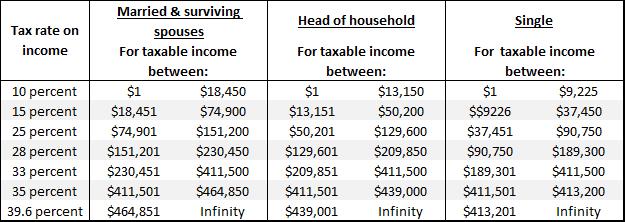As IRS commissioner John Koskinen has publicly admitted, the 2014 tax year will be one of the most complicated and stressful to process in the history of the IRS. Last-minute changes to tax credits and deductions, new tax rules relating to the Patient Protection and Affordable Care Act (“Obamacare”) and a reduced IRS budget will create a perfect storm of hot tax mess starting in January. Processing delays – even disappearing returns according to National Taxpayer Advocate Nina Olson – can be expected.
New income tax brackets
For TY2014 income there are now 7 tax brackets. The brackets break down differently depending on your filing status as well. Some of the brackets are tiny; the 35 percent bracket for singles covers less than $2,000 of income.
| Tax rate on income | Married & surviving spousesFor taxable income between: | Head of householdFor taxable income between: | SingleFor taxable income between: | |||
| 10 percent | $1 | $18,450 | $1 | $13,150 | $1 | $9,225 |
| 15 percent | $18,451 | $74,900 | $13,151 | $50,200 | $$9226 | $37,450 |
| 25 percent | $74,901 | $151,200 | $50,201 | $129,600 | $37,451 | $90,750 |
| 28 percent | $151,201 | $230,450 | $129,601 | $209,850 | $90,750 | $189,300 |
| 33 percent | $230,451 | $411,500 | $209,851 | $411,500 | $189,301 | $411,500 |
| 35 percent | $411,501 | $464,850 | $411,501 | $439,000 | $411,501 | $413,200 |
| 39.6 percent | $464,851 | Infinity | $439,001 | Infinity | $413,201 | Infinity |
Capital gains taxes expand
Capital gains covers what you earn form your investments. Gains on investments held for less than one year are considered short-term and are lumped together with your ordinary income. Gains on investments held for more than one year receive special tax treatment. For 2015 the tax rate applied to long-term capital gains will depend on tax bracket:
- Tax returns in the 10 percent and 15 percent tax brackets will not pay any capital gains taxes
- Tax returns in the 25, 28, 33 and 35 percent tax brackets will pay 15 percent in capital gains taxes
- Tax returns in the 39.6 percent tax brackets will pay 20 percent in capital gains taxes
There are also several other important capital gains tax provisions to note:
- Ordinary dividends: Will be taxed lumped together with ordinary income.
- Qualified dividends: Will be taxed at the long-term capital gains tax-rate of the tax payer.
- Net Investment Income Tax: This new tax is 3.8 percent on all investment income including capital gains. It is only triggered on tax returns reporting Modified Adjusted Gross Income of $250,000 (if married and filing jointly), $125,000 (if married and filing separately) and $200,000 (if filing as single or head of household)
Payroll taxes increasing
Payroll (FICA) taxes consist of the Social Security tax, Medicare tax and the new additional Medicare tax for higher-income earners. For 2015:
- Social Security tax: 12.4 percent of earnings on income up to $118,500
- Medicare tax: 2.9 percent on all earnings
- Additional Medicare tax: 0.9 percent on all income above $250,000 (if married and filing jointly), $125,000 (if married and filing separately) and $200,000 (if filing as single or head of household).
2015 will be the year you want to seriously consider outsourcing payroll if you don’t do so already.
Changes to retirement account contributions
Contributions to retirement accounts are changing for 2015 and in some cases you can put away a great deal more than last year.
- SEP-IRA and Solo 401(k): The maximum contribution increases to $53,000 for both types of accounts commonly used by small business owners.
- SIMPLE IRA: The contribution limit increases to $12,500. Anyone age 50 or older on December 31, 2015 may contribute an additional $3,000 in “catch-up” contributions.
- 401(k): Employees may contribute up to $18,000. Anyone age 50 or older on December 31, 2015 may contribute an additional $6,000 throughout the year to “catch-up” on their retirement savings.
- IRA: The contribution limit stays at $5,500 with an additional $1,000 for “catch-up” contributions.
Bitcoin payments are considered taxable income
The IRS might experience delays in processing returns but they aren’t wasting anytime in dealing with virtual currencies. Even though virtual currencies are not considered “legal tender” for TY2014 the IRS has indicated that taxpayers should treat them as property with tangible value. This means that income taxes, payroll taxes and capital gains taxes are all applicable to virtual currency.
Tax extenders – relief is still far away
American Taxpayer Relief Act of 2012 (ATRA) included 55 tax deductions, credits and other benefits that sadly expire on December 31st of this year. 14 of these are for small businesses and 12 for consumers. In order to extend these credits, Congress must pass a law and the president must not veto it. So far only the House of Representatives has passed a bill to extend the ATRA benefits. The Senate and the President disagree with a short-term approach but the Senate has scheduled a vote without changes to the House version. If this does pass before December 31st then they all expire. The Congress could pass the law next year and apply it retroactively but that would just add to the already complicated tax year.
IRAs limited to 1 rollover per person per year
Even though this won’t impact your TY2014 returns you have to keep it mind. Up until now the IRS allowed owners of IRA accounts to transfer the balances from one account to another account (called a “rollover”) once every twelve months without paying any interest or penalties. If you have 3 IRAs you could rollover each account without a problem. A recent tax court decision changes that. Starting in 2015 each person will only be allowed to perform one rollover every twelve months regardless of how many IRAs they have. This includes SEP and SIMPLE IRAs popular among small business owners. Any additional rollovers will subject the account to taxes and penalties. The only exemptions are conversion rollovers from traditional to Roth IRAs and trustee-to-trustee transfers where the account stays intact.
What’s not changing: tax refund timetables
Across social media websites there is tremendous buzz regarding a “new IRS directive” which states that all tax refunds due to consumers will not be paid until October 2015 regardless of when they file their return. The source of the news is a satire website which did an all-too-realistic article on this supposed change. The article has been shared tens of thousands of times leading to misplaced outrage. It’s a hoax.
While you can’t avoid sending your tax returns to the IRS you can minimize the chances of delay by filling your returns correctly. Whether you self-prepare or pay professional preparer to help you make sure that these changes are taken into account.

